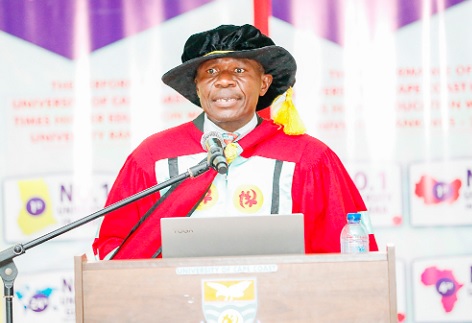
Address development gap between north, south
A Professor of Migration and Refugee Studies at the University of Cape Coast, Professor Augustine Tanle, says there is urgent need to provide alternative sustainable livelihoods in the five regions of the north to halt the worsening poverty and deprivation in the area.
He noted that Ghana had performed poorly in bridging the development gap between the north and the south and called for strategies that could create opportunities for investments in agriculture and non-agriculture enterprises to create wealth and reduce poverty.
He indicated that if efforts were not made to urgently bridge that gap in socio-economic development, the country could not achieve many of its sustainable development goals targets.
In order to achieve that, Prof. Tanle called for a conscious effort by the government to set up industrial zones to create employment in the five northern regions and educational drives and the setting up of more agro-based industries to help reduce poverty levels among the people and enhance socio-economic development.
Prof. Tanle was speaking at his inaugural lecture on the topic, "Interrogating North-South Seasonal Labour Migration in Ghana as a Livelihood Strategy”.
He said Ghana might not achieve Sustainable Development Goals (SDGs) 1,2, 4,6 and 10 which included no poverty, zero hunger, education, clean water and sanitation and reduce inequalities if nothing was done to improve the quality of life of the people.
Support livelihoods
Prof. Tanle said it was time to provide support for agriculture and farmers in the north to optimise their land use and produce to feed the nation.
He observed that while many migrated seasonally to the cities to seek better lives, others migrated to other farming communities because they did not have adequate provision and inputs to farm in the north.
![]()
He said if Burkina Faso, which had poorer quality lands in terms of farming, could produce enough tomatoes for supply to Ghana, then the country had no excuse for not investing amply in farming in the northern regions.
Factors
He explained that there were factors, including the push: the high poverty levels, lack of access to quality education and health care, among others, that pushed many in the northern regions to migrate southwards.
Again, he said, the pull factor included infrastructural development in the south that occasioned migrants down from the north.
Apart from these, he indicated that there were other socio-cultural factors and the migration networks that also compelled many to move downwards.
Reduce vulnerabilities
He said it was time to work to reduce the vulnerabilities in the northern regions to keep them from migrating, saying many of the conditions that made them to migrate no longer existed down south, leaving them poorer.
"For instance, the Aboboyaa and Pragya are now competing with the kayayei in Accra.
This leaves them more vulnerable.
If the disparities were not adequately addressed there would be transfer of intergenerational poverty in the five northern regions.
Prof. Tanle observed that in spite of the many negative effects of the migration to the south, many families have had their socio-economic statuses changed because someone moved seasonally down south to work.
The Vice-Chancellor of UCC, Prof. Johnson Nyarko Boampomg, said he was certain that the exposition would engender conversation on the issues raised.
Background
Prof. Tanle obtained his Bachelor’s degree from UCC in 1994 and his Master of Philosophy in 2003.
He has been lecturing at the university since 2004.
He was promoted to senior lecturer in 2009, to associate professor in 2014 and professor in 2018.
His research interests are migration, livelihood and development, gender and migration and refugee studies and endogenous development.
